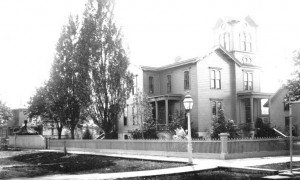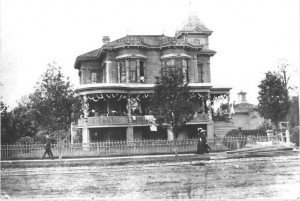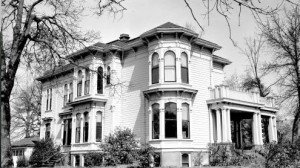The Lifeline of Louisa Breyman Waite (1823-1907)
Louisa, sister of Werner and Eugene Breyman, was ten years the senior of her sister-in-law, Isabel, and fifteen years older than Margaret. She may have had less in common with her brothers’ wives than they had with each other. However, their three homes were within a few blocks of each other, reflecting their close relationship.
The home of E. M. and Louisa Breyman Waite
This is the present site of the former Carnegie Library at State and Winter Streets
Our records of Louisa come from contemporary published articles. In 1865, The Pacific Christian Advocate’s annual report on education offered by Willamette University, included this paragraph:
“The musical department of the institution, for several years past, has been under the faithful and skillful management of Miss Luisa Breyman – and every succeeding examination has given evidence of great improvement. The music, during the commencement exercises, has not only been completely successful, but a decided triumph. Miss B. is entitled to great credit for her efficiency and perseverance in this ornamental department.” During this same year, she also taught German, “her native language”. Also on faculty were two women whose lifelines are included in this series: The daughter of Jason and Lucy Thompson Lee, Lucy Lee, now Mrs. Francis Grubbs, was teaching English Literature and French; Chloe Clarke Willson, who had been a teacher, would become Governess of the Ladies Department in the next term.
Over thirty years later, in 1897, her husband, Mr. Waite, while participating in a parade of local baseball teams, suffered a heart attack and died. The Capitol Journal newspaper reported: “Kinsmen of the deceased gentleman arranged for breaking the shocking news to his enfeebled wife, who, happy in her pretty house, was engaged in pleasant preparations for a summer outing at Newport, whither she and her husband were to go in a few days with Mr. and Mrs. S. C. Adams. The speedy appearance of her brother Werner Breyman and the ladies of his family, so softened the blow to Mrs. Waite as to leave her quite composed and she was reported as resting peacefully and bravely under the awful burden trust upon her in her declining years.” [She was 69]
In 1907, this tribute marked her own death: “Mrs. Louisa Waite, who passed away peacefully at her home yesterday was one of Salem’s earliest pioneers, being a member of the Breyman family so prominently identified with the development of Oregon. She was 84 years of age and always enjoyed very good health until a gradual failing of her strength took place as she advanced in years. She was the widow of E. M. Waite who died in 1897, and who was well known in business circles in Salem…She was a remarkable woman. She had the chair of music in Willamette University in days gone by. She taught many German classes. She was a woman of culture and remarkable energy. Up to two weeks ago, she did her own cooking and housework, and steadily declined the many attempts of her near relatives to provide her with help. She loved life and her fellow creatures, but did not wish to be a burden. About two weeks ago, she realized she would not be strong again, and so she wanted to go. She was ready. She went peacefully, as if drawing the mantle of her couch about her and lying down to pleasant dreams. Her husband, E. M. Waite, went some years ago, almost without warning. They were for years probably the most joyful old couple in Salem. They were the life of any company. They were always young in spirit, although well along in years. There is no old Salem resident who will not have tender and pleasant memories when reminded of this good woman. If Mrs. Waite ever had an enemy, she did not know it. She held all people as her friends.”
The Waite fountain in Willson Park was created by Louisa as a memorial to her husband after his death. The colorful lights that played upon the waters at night were a community delight until 1962. The wind storm of that year destroyed the machinery producing the effect and where it was reconstructed that feature was not included.
Lifeline of Isabel Watt Breyman (1833-1907)
The home of Werner and Isabel Watt Breyman, c. 1903
This is now the site of the the Micah Building at State and Cottage Streets
We have more information about Louisa’s sister-in-law, Isabel, wife of Werner and daughter of John Watt and his wife Mary Scott . Born in Mt. Vernon, Ohio, December 1, 1833, her childhood was spent in Missouri. In 1848 her family crossed the plains and settled in Amity, Yamhill County. Her brothers were Joseph and Ahio, noted Oregon pioneers. (Joseph’s son James built the house at the southwest corner of 14th and Chemeketa streets.) In 1853 she married Werner Breyman, and twelve years later, in 1865, moved to Salem.
In reference to her as a young woman, her 1909 obituary recalls she was a “Cheerful, capable and energetic young girl married to young merchant of pioneer village of Lafayette … at a time when everybody knew every body and when true neighborliness resulted from a society characterized by a an almost perfect equality in worldly possessions.” The obituary described her role in Salem as a “woman of great refinement, kind temperament and essentially a woman of the home. To her family she was ever the kind, loving wife and mother and her home life was of a singularly pure, sweet character.“
Werner Breyman’s merchant enterprise, and his successful business partnership with his brother Eugene, allowed the couple to build, before 1871, a substantial home on the southwest corner of State and Cottage streets, then a residential neighborhood. The first floor of the house, elevated above a daylight ground floor, had a generous front porch facing State Street. Two bay windows decorated the second floor and a tower rose in a third floor the east side of the structure. In 1923, when the house was moved around to Cottage Street for the construction of the Elks Club (now the Micah Building), it housed 20 apartments. It was later demolished.
The Breyman families enjoyed travel: they “camped” on the grounds during the annual State Fairs, took tents and equipment (including a Chinese cook) when they made the over-night journey to Seal Rock for summer vacations. In what must have been an unusual adventure for Salem residents in 1896, Isabel and Werner also enjoyed what was known as the Grand Tour, traveling in Europe for 6 months.
Isabel was mother to seven children, only four of whom survived infancy: Elva, Mrs. Clifford Brown, 1856-1934; Ada, Mrs. William Eldridge, 1857-1934; and Anna, Mrs. Rudolph Prael, 1865-1968. Carl, the only son, died of typhoid fever in 1878 at the age of 10. His obituary recalled how Carl “had so much to live for…in his destiny that promised so much from his manhood” and deeply sympathized “with the parents and sisters who thus see the darling of the house taken from them.”
Tragedy struck the family again in 1927 when her 42-year-old grandson, Clifford, the son of Ada and William Brown, drowned in Alaskan waters while on a eight member hunting and fishing expedition. Four days of searching the remote Gardner Canal did not recover his body. Alice, his widow, returned to Salem and their two young sons, Chandler and Werner Brown. In 1935 she named their home “Deepwood” from a favorite book of these sons.
Lifeline of Margaret Skaife Breyman (1839-1918)
This home of Eugene and Margaret Skaife Breyman was moved from Church and Court Streets (present site of Statesman Journal Building) to Summer Street, just south of Mill Creek, the location of this photograph. It was demolished for the State Lands Building.
Margaret Skaife Breyman was the wife of Eugene Breyman. Despite a romantic story that she learned to walk as one-year old toddler crossing the plains on foot with a wagon train, the truth is that as an infant in 1840 she came from England with her parents on a sailing vessel. The family settled on a farm near Dubuque, Iowa, but her parents died in 1861 and she journeyed west by ship through the Isthmus of Panama to San Francisco and on to Salem by stagecoach. She made her home with her sister Mrs. Henry Rickey when they moved to Walla Walla. Eugene Breyman, who had met her at the Gilbert home in Salem, married Margaret at her aunt’s home in 1864. Their first home was replaced within a few years by a Victorian mansion, in which they resided for the rest of their married life. During those years, social life, political ceremonies and Salem festivities like the Cherry Festival parade revolved around Court Street and this imposing residence. Seven family funerals were conducted here.
Three daughters survived their parents:
Lena, (1865-1952) married Frank Snedecor of Birmingham, Alabama in 1902. After his death in 1918, she returned to Salem. Her funeral was the seventh conducted in the family home, by that time moved to Summer Street.
Minnie Louise, (1868-1965) married Reuben Boise, Jr. in 1891. She was affectionately called “GaGa” by her family and her many lifetime Salem friends. Her husband died in 1934 of an accidental gunshot while on a hunting expedition at his Polk County property, Ellendale. Mrs. Boise died at her Kingwood home in West Salem in her 97th year.
Jessie (1877-1918) married Charles McNary in 1901. The couple lived next door to his parents’ Court Street home until his election the United States Senate in 1917. In the next year, while she was in Salem for the funeral of her mother, Jessie died in an automobile accident in which her sisters Lena Snedecor and Minnie Boise (with their husbands) and her nephew Breyman Boise, the driver of rhe car, were slightly injured. The trio of sisters was very close, and shared many friends in Salem, making this reunion especially tragic.
Reuben Boise, Jr. (the husband of “GaGa”) was the son of Judge Reuben Boise, one of early Oregon’s most respected jurists. The judge married twice:
In 1850 Ellen Frances Lyon of Boston was a young schoolteacher in Chicopee Falls, engaged to Reuben Boise of Oregon. With her sister Susan and brother Whitney, she sailed around the horn on the clipper Flying Cloud for a San Francisco wedding. Her father, taking a shorter route through Panama, would be there for the wedding. [He would become consul to Japan in the administration of President Ulysses S. Grant and died in Yokohoma in 1871.] Susan fell in love with Laban Coffin, a member of the ship’s crew, and there was a double wedding. [The Coffins traveled on to China.] In Ellen’s first letter home, she is “enjoying housekeeping in her nice little house in Polk County [Ellendale], but lonely as Reuben rides the circuit as a prosecuting attorney for the Territory.” Many of her early letters express her desire for letters from her family, wondering if they have forgotten her, so far away. Even when describing the joy of her first son, Fisher, born in 1852, she writes, “I am obliged to stay alone a great part of the time which makes it exceedingly unpleasant in this ne country for society of the right kind is extremely scarce.” In 1854, Reuben’s sister Elizabeth came to Oregon, reporting her first horseback riding lesson,” Ellen went with me [riding] four miles to a store [where] she got herself and me gingham for morning dresses…such a beautiful valley we rode though… I was a little disappointed when I first got here as Reuben’s house is not finished & things appear different from what I expected, but they rejoiced to see me and Ellen has a faculty of making herself agreeable to everyone and is a universal favorite in the whole Territory.” She hopes Mr. Bush (returning to Oregon) will bring family daguerrotypes and promises to have some made here. The family (including sister Levina Watt) had at least one reunion in California where her father and brother Whitney had settled. Ellen had two more children at Ellendale, Eugene and Elizabeth, both of whom died as infants. After a short residence in Portland, Judge Boise purchased a 6-acre Salem property [where Sacred Heart was later established] and planted it in fruit tress. Both Reuben Breyman Boise (1959-1934) and Whitney Boise (1862-1930) were born there. The letters written by Ellen in 1862 and 1865 are happily filled with news of her children, the Methodist Cherry Festival, her relief in having “an Indian woman “to wash for me every week or so” and family news typical of any young wife in her 30s.
Ellen died in 1865 “after an illness of about ten days.” As Reuben wrote,” She was attacked by inflammation of the brain…the disease went to her heart and lungs…shortness of breath finally took her life. She was a large, healthy looking women apparently destined for a long life…she was a member of the Congregational Church in Salem and an honest a good woman who had many friends… and influence in the circle which she moved. Elizabeth [her sister-in-law] was present when she died…”
In 1867 the judge married Emily Pratt of Worchester Massachusetts, the daughter of Ephram Pratt, a Massachusetts manufacturer and sister of Captain Pratt who started the first woolen mill here. Her life was recorded in these excerpts from her 1919 obituary:
“Miss Pratt taught in the Salem public schools until she was married on December 27, 1866, to the late Judge R. P. Boise, for many years honorable and ably connected with the Judicial history and life of Oregon, as circuit judge and justice of the supreme court. Judge Boise passed into the great beyond in Salem on April 10, 1907. After their marriage, they made their home for many years in the historic Jason Lee house, on North Liberty street, the first house built in Salem. The mills of which Jason Lee himself helped to hew. The children from this marriage were Ellen S. Boise, drowned at Sea View, Wash. In August 1891, and Maria “May”, wife of John H. Lauterman, with whom the deceased had lived for a long time, and whose home at 475 North Summer street she passed quietly and peacefully to rest, as stated, yesterday morning at two, after a very short illness brought on by a severe cold. The good woman was prominent in all things uplifting in this vicinity for a long term of years. She was a member of the First Congregational church. She was a good wife, mother, neighbor, and a true friend. She lived a life of usefulness and faithfulness long beyond the scripturally allotted time, being active even up to a day before her passing.”



